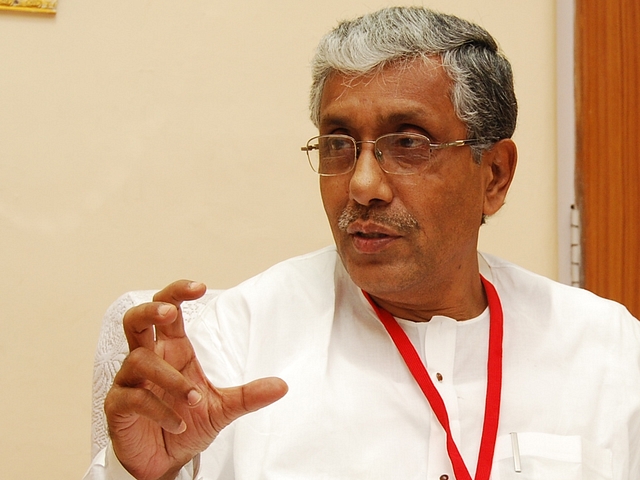
Understanding Manik Sarkar Phenomenon
Why Manik Sarkar looks set to come back to power for a 4th term
Tripura is a state many would even struggle to accurately locate in map of India, leave alone remember or know there is an assembly election there this year. It falls on 14th Februray followed by declaration of results on February 28. February 14 would be an important date for Manik Sarkar, the incumbent Chief Minister, who completes 14 years in the top post. He is one of the longest serving Chief ministers in the country, and if trends are to be believed, will win another election to make it 19, taking him close to the record held by his political idol in his younger days Jyoti Basu. But more than these statistics, Tripura holds significance in Indian political milieu. It is, as of data, the last remaining Communist Bastion left in India. Mamata Banerjee has defeated the Left in their stronghold West Bengal and Congress has had a wafer thin victory in Kerala, leaving this state with 60 assembly seats and 4 districts as the only remaining Communist ruled state in India
But Manik Sarkar is not Jyoti Basu or V. Achyuthanandan. He is hardly a Communist in the textbook sense of the term. In fact, he is closer to Manohar Parrikar in ideology than a Prakash Karat. The national politburo doesn’t interest him. Power has not corrupted him. A Graduate from the University of Calcutta, he considers himself to be a servant of the people of Tripura first, a party worker later. His wife Panchali can be seen buying her own vegetables and taking a rickshaw back home. And the people of Tripura adore him for this simplicity
When Manik Sarkar took over from Dasarath Deb (a 4-time MP and Tripura’s first tribal CM) in 1998, the state was in a state of turmoil. The indigenous tribal population (some of who were descendants of the various royal families) was in a constant state of struggle with the Bengali population over resources. The economy was in shambles, farmer suicides were a daily occurrence, and the Government at center (NDA) wasn’t exactly friendly. But Manik Sarkar slowly turned it around. No big industries were willing to come to the state (they still don’t), the literacy rates (especially the tribal population) was low, which meant employability was a problem and bank loans for entrepreneurship were hard to come by.
So, first step was to strengthen the education system. Primary education was the focus in the first term (1998-2003). School dropout rates fell significantly in this period. The second term (2003-08) was landmark in terms of higher education – being a coalition partner of the UPA meant a number of ITIs, IIIT, Medical and Dental Colleges, NIT was started. This pattern of development those who completed their primary education in the early 2000s found colleges to go to in their state itself. A lot of youth found started finding jobs in the cities of Guwahati, Calcutta and Siliguri. Small scale industries got a fillip, especially in fertilizers, chemicals, rubber products and small machinery
Trade with Bangladesh also increased during this period as well. The Grameen Bank model was implemented here. Co-operative societies came up, and small-scale industries got a further boost. Manik Sarkar wanted to project tourism as a major industry, but he had major challenges here as well. The biggest challenge was the ethnic clashes, but employment and education opportunities meant the basic reason over the strife – resources, natural and man-made was gone
The third term (2008-2013) has been about large-scale projects. Hydro-electric power projects have come up in several places in the state. Tourism, by both Indians and foreigners has been good money spinners. Farmers have easy access to cheap electricity, farm equipments and fertilizers. Good agricultural produce means far fewer farmer suicides and lesser need to buy from other states, thus releasing the pressure on the state exchequer
The 2013 challenge
Currently the Left has 49 seats in the 60-seat assembly, Congress has 10 and INPT (Indigenous Nationalist Party of Triipura) has 1. Trinamool Congress, till 2010, had negligible presence in the state, and has come up several notches with wins in a few local panchayats. But unlike Bengal, they do not present a serious threat. They can win 4-5 seats, mostly from the Congress tally, but highly unlikely to make a dent in the Left bastions. The primary reason is the serious infighting between various factions. Mamata Banerjee’s charisma doesn’t work here, and she has little control over the state unit. Professor Manik Deb, a professor in Tripura University and the local Trinamool head doesn’t have the control or resources to make a mark this time, other than Agartala and its surrounding areas
Tripura is a state where the term “votebank” has almost become non-existent due the excellent development work done by Mr. Sarkar. In a few seats like Ambasa (where hostility to Bengalis still exist) and where the INPT chief fights, the indigenous tribal populace form a small votebank, and vote for INPT. Muslims are about 7% of the population, and attempts by Congress to polarize them hasn’t worked, other than a couple of places like Sonamura, a Congress stronghold
Issues
Tripura has scripted a turnaround in literacy levels under Mr. Sarkar. The percent of literate population is 3rd highest in the country after Kerala and Mizoram, at 85%. Bijli –sadak-paani remain major issues, but is on the right path. Implementation of central social welfare schemes is shaping up well. A number of new medical colleges, hospitals and health centers mean health conditions have improved considerably
Voting percentages, especially among women is getting better. And this year plans to be no different. This communist bastion remains safe, though, I would like to remind my left-liberal friends – Manik is more Manohar than Prakash. And we can do with more of his type